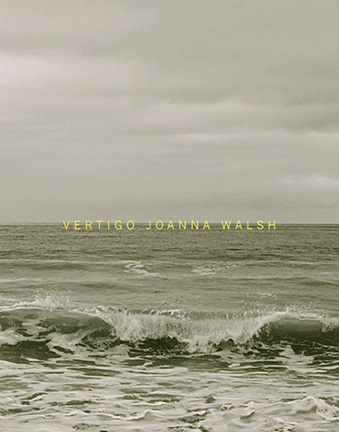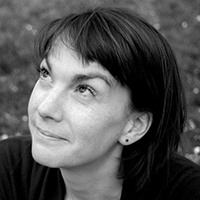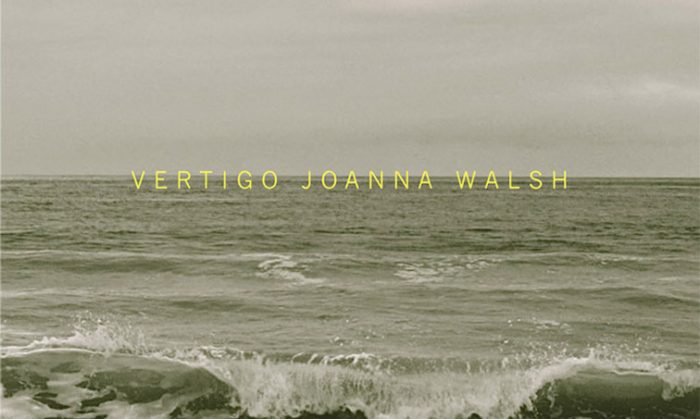“The feeling of falling, which was not falling”
A review of Vertigo by Joanna Walsh
Dorothy (US), 2015; And Other Stories (UK); Tramp Press (Ireland), 2016. 123pp

Review by Ruby Cowling
Struck with vertigo, suddenly things are not what you thought. You’re dizzy, disorientated, and it turns out the world is not, after all, what your brain has been constructing every day through its normal sensory feeds. Actual physical vertigo is not pleasant, but a literary style that steps away from the one we know best is exciting, and Joanna Walsh’s approach in this collection certainly does that.
This is not to say that her stories are obscure or “difficult”; I’d hesitate to even label them with that damningly nutritious word “experimental”. They are full of recognisable situations, humour and relatable moments. It’s just that she goes directly for “the truth”, without all the niceness that the mainstream short story slips into so easily. She unhooks herself from common expectations of narrative, in turn untethering the reader from the standard, safe experience of reading short fiction.
Short stories in the form we know best – the form you find in weekend magazines or in annuals from big, safe publishers – typically feature a little aching moment of truth at their heart, which is wonderful, of course; it’s an authentic experience, a quiet, humane offering in a noisy and brutal world. But too often they’re under pressure to deliver that moment up to the reader in a nice velvet-lined box of comfort and familiarity (a named character, going about business you recognise (even if in an exotic setting), working up to a relatable moment of realisation or change). The lid of that beautiful box gently closes at the end of the story, reassuring you of solid ground. However, instead of apologetically working up to a tentative assertion about Life, Walsh just states a truth and kicks it around – no box, no lid, no tethering it to reassuring elements such as softly-introduced character or plot. Because she pulls no punches in her stories – simply stating facts, observing behaviours and honestly presenting the kind of psychic darkness that usually gets fudged – the peculiar is made powerfully universal.
There is so much in this collection: so much intellectual and emotional content, so many direct gestures toward the biggest, scariest parts of human existence. No wonder we get dizzy. One of her skills is to achieve an almost-real-time expression of thought. Internal reality moves quickly and the resulting impression is that we are inhabiting a real mind. “A man sits down at the table next to me. I wonder whether he is French, whether he is foreign, whether he is a tourist. I also wonder whether I could say hello to him, in French or in English, whether we would like each other, whether we could sleep together.” Aren’t characters in cafés supposed to mull things over in a Stately And Important Way, using their observations of the people around them to Come To A Subtle But Profound Conclusion? Once again, we are untethered from expectations, unhooked from the usual steady, authorly manipulation of time. Walsh gives us a more honest experience, and we are giddy.
“The first effect of abroad is strangeness,” says the opening story’s narrator, and it’s because we are “abroad” stylistically that it feels strange at first. But my argument is that these stories are more radically realist than the standard so-called lyrical realism. Drowning, the final story, may be one of the more accessible stories in the collection (perhaps deliberately, so that we think we’re back in safe waters and are even more emotionally unprepared for the stunning ending), and even here Walsh doesn’t shy away from admitting that “the abyss” is real, and although it is “your family who would not like to see” it, it is nevertheless a real part of lived experience which must be acknowledged, however vertiginous that makes us feel.
* * *
Some of the fourteen stories are very short and focused, addressing quite viscerally the internalities of humanhood – and, all right, of womanhood. Here, I get hesitant. It’s essential not to circumscribe Walsh’s intellectual ambition by claiming her focus is “women’s experience”. It’s easy for it to seem that way, because her narrators are female, and because of her “otherly” narrative form – the “other” arguably being aligned with the feminine. She speaks powerfully and concisely of the experience of “failed girls”, and many of her detailed observations encompass clothing, food, and the specific ways people touch each other and use language to manipulate their relationships. Historically, these have tended not to be Great Literature’s dominant concerns; I don’t have a PhD-length space here, so let’s quickly agree that this is because clothing and food have been part of the domestic realm and the significance of the domestic has been side-lined, and that if a writer includes these, the writing ends up with the label female interest. This is not a complimentary epithet: it still carries the accusation of smallness, weakness, intellectual parochialism, so I am loath to bring it up at all. But there is still that political paradox in which you have to marginalize yourself to point out that your voice is not yet, and should be, part of the mainstream – so, there, I’ve brought it up.
These female interest stories are stark and muscular; full of invitation, full of provocation, full of the acknowledgement of the non-separation of body and mind. This latter position has been a concern of feminist thought, and there are certainly explicitly “feminist” moments here (“I’ve heard him shout at her to pick up the telephone, as though she were his extra hand”, says the narrator in Claustrophobia, about her parents). But even to label these as “feminist” is to put a boundary around them: to say, well, that’s an argument, that’s a position, an opinion – instead of a fact. Hence my hesitation to bring up any of these terms.
What Walsh does, in her refusal to use standard story conceits or a banal lyrical realist style to soften the blow, is to bring all this female interest material into the realm of hard fact – of unapologetic, undeniable truth – reminding us that women’s intellectual lives are actually being lived, in reality. They are not a special interest or a theory. They are real.
It still feels radical to be intellectual, in fiction, from a specifically female perspective. It gives us vertigo. “There’s something about our un-control, no men to watch over us,” notes a character in Claustrophobia, a story in which the narrator’s father dies. “What if it never stops?” In these moments vertigo is giddy possibility: freedom, danger, adventure, the sudden removal of the gravitational force of embedded power structures.
* * *
For reasons I’ve just alluded to, clothing is a neglected node of social significance; Walsh’s narrators notice clothing and its meanings perhaps more than any other writer I’ve read. Indeed, the book opens with Fin de Collection, a plot-light exploration of a Parisian department store and its stock (and its customers). In later stories, her eye for clothes is that of an artistic sociologist: she knows what these colours and shapes and fabrics and choices mean. Nurses’ uniforms in The Children’s Ward are unsettlingly the same blue as the attendants at petrol stations; in Relativity a grandmother’s “shades are mint, peach, lemon, blueberry, cream. She dresses as she would like to see her granddaughter dressed: edibly.” A daughter’s “short pink skirt with lace” ignites the title story. And in the Paris of Half The World Over, the young women tourists “are all dressed the same, in the current fashion. The older women are dressed either more primly or more provocatively than the older women, but always in reaction to them.” The iterative effect of these observations is that they are not the stuff of flimsy domesticity but a type of forensic anthropology.
Walsh is preoccupied with the disorientating experiences of contemporary life; its shocks; its threats; the things that throw us off balance. And what delights me most is that she doesn’t shy away from any of it: she doesn’t pull the cozy blanket of standard narrative over the dark and difficult things. Like family. In the complex, multi-generational story Claustrophobia, children are mentioned in passing as “blind lumps of my flesh, detached…”, while the narrator wrestles more centrally with the meaning of her own mother. In The Children’s Ward babies and children are the pulsing, “beeping” heart of the horrific tension of being a parent at all. This story is strung out with the hopeless terror attached to parenthood, the supremely attached status a mother has, against her own will. Young Mothers takes this further: the mothers have become children in the way they dress, behave, and speak, even though it is mysteriously important to everyone that the contract remain “kids be kids” and “mothers be mothers”. Do we get soothing resolutions to these unsettling scenarios? Of course not.
It’s brave and essential to lay out so starkly the details of life – and often, women’s lives – in all their uncomfortable ambiguity. Not to say that laying things out starkly means there are no layers of meaning – quite the opposite; this book is full of those. But the layers of meaning aren’t here because of that standard, MFA-story, show-don’t-tell manipulation. They’re part of the honest presentation of the complexities we negotiate as we go through life, as “good people, who can hardly live in this world, which continues almost entirely at our expense”.
Vertigo is packed full of the stuff we’re afraid of and attracted to, in the way we’re attracted to wild animals and cliff edges and the disconcerting behaviour of other humans we’re close to. And ourselves. The overall experience is exciting in the way only a truly original reading experience can be.
BIO
 Ruby Cowling is a British writer currently living in London. Her work has won awards that include, The White Review Short Story Prize and the London Short Story Prize, and has been shortlisted in contests from Glimmer Train, Short Fiction, and Aesthetica, among others. Recent anthology credits include I Am Because You Are (a Freight Books collection of work inspired by the theory of General Relativity); Flamingo Land and Other Stories, from Flight Press; and Unreal City: Constructing the Capital, a book of fiction and non-fiction about London, from Cours de Poétique.
Ruby Cowling is a British writer currently living in London. Her work has won awards that include, The White Review Short Story Prize and the London Short Story Prize, and has been shortlisted in contests from Glimmer Train, Short Fiction, and Aesthetica, among others. Recent anthology credits include I Am Because You Are (a Freight Books collection of work inspired by the theory of General Relativity); Flamingo Land and Other Stories, from Flight Press; and Unreal City: Constructing the Capital, a book of fiction and non-fiction about London, from Cours de Poétique.














